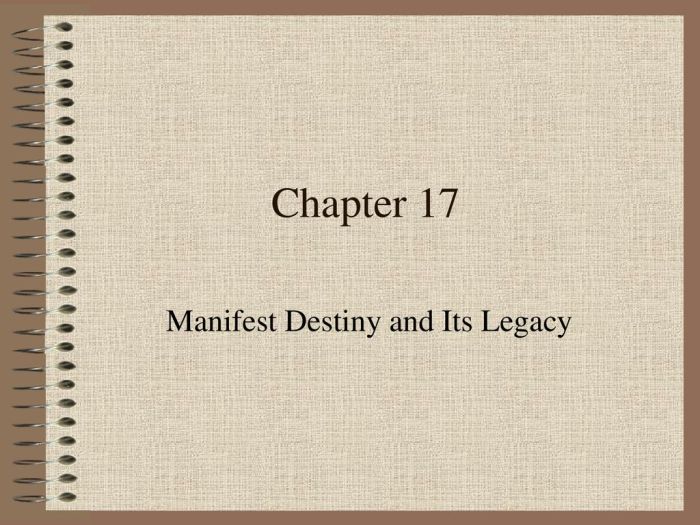Chapter 17 manifest destiny and its legacy – Chapter 17: Manifest Destiny and Its Legacy delves into the profound impact of the 19th-century American belief in their divine right to expand westward across the continent. This chapter provides a comprehensive examination of the origins, consequences, and ongoing controversies surrounding this pivotal concept.
The exploration of Manifest Destiny encompasses its historical context, tracing its ideological foundations and the political and economic forces that fueled westward expansion. It delves into the devastating impact on Indigenous populations, including forced removal, assimilation, and genocide. Furthermore, the chapter analyzes the environmental consequences of deforestation, habitat loss, and species extinction.
Historical Context

Manifest Destiny emerged in the 19th century as an ideological belief that the United States had a divine right to expand westward across the North American continent. Its origins can be traced to the Enlightenment ideals of progress, individualism, and national exceptionalism.
Political and economic factors also fueled westward expansion. The Louisiana Purchase in 1803 doubled the size of the United States and provided access to vast territories in the West. The Mexican-American War in 1846-1848 resulted in the annexation of Texas and California, further extending the nation’s borders.
Impact on Indigenous Populations

Manifest Destiny had a devastating impact on Native American tribes. As settlers moved westward, they encroached on Indigenous lands, leading to conflicts, forced removal, and assimilation. The Indian Removal Act of 1830 authorized the forced relocation of Native Americans from their ancestral lands in the East to reservations in the West.
Westward expansion also resulted in the genocide of Native American populations. Diseases introduced by European settlers decimated Indigenous communities, and violent conflicts with the U.S. Army contributed to the loss of lives and cultural traditions.
Environmental Consequences

Westward expansion had significant environmental consequences. Deforestation, habitat loss, and the extinction of species occurred as settlers cleared land for agriculture, mining, and transportation. The introduction of non-native species disrupted ecosystems and contributed to the decline of native flora and fauna.
The long-term effects of Manifest Destiny on natural resources and ecosystems continue to shape modern environmental conservation efforts. The legacy of westward expansion has led to a greater awareness of the importance of protecting and preserving natural resources.
Economic and Social Transformations
Manifest Destiny created both economic opportunities and challenges. The growth of agriculture, industry, and transportation in the American West fueled economic expansion. The discovery of gold and other resources attracted settlers and investors, leading to the development of new towns and cities.
Westward expansion also had a significant social impact. The rise of new communities and the changing demographics of the United States contributed to the development of a diverse and dynamic American society.
Legacy and Controversies: Chapter 17 Manifest Destiny And Its Legacy
Manifest Destiny remains a controversial topic in American history. Its legacy continues to shape debates about immigration, land use, and national identity. Some historians argue that Manifest Destiny was a driving force behind American foreign policy and the nation’s global ambitions.
The legacy of Manifest Destiny also raises questions about the treatment of Indigenous peoples and the environmental impact of westward expansion. Ongoing discussions about these issues highlight the complex and contested nature of Manifest Destiny’s impact on American society.
FAQ Section
What were the key factors that contributed to the rise of Manifest Destiny?
Political and economic ambitions, the belief in American exceptionalism, and the availability of vast territories to the west.
How did Manifest Destiny impact Indigenous populations?
Devastating consequences, including forced removal, assimilation, and genocide, leading to cultural and linguistic loss.
What were the environmental consequences of Manifest Destiny?
Deforestation, habitat loss, extinction of species, and long-term damage to natural resources and ecosystems.